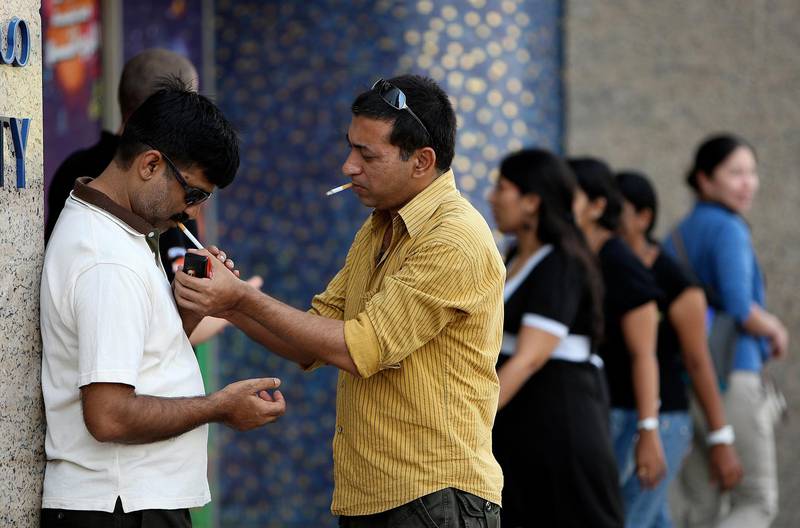President Joe Biden is considering public policy to cut nicotine levels to below addictive levels to encourage more people to quit. Pawan Singh / The National
A war on nicotine could transform society’s fight against cancer, heart disease and ill-health.
Medical experts said plans in the US and New Zealand to slash the amount of nicotine in cigarettes could save millions of lives.
US President Joe Biden’s administration is reported to be planning an assault on the tobacco industry, just days after Jacinda Ardern’s government in New Zealand set out plans to make cigarettes so weak they are no longer addictive.
Reducing the amount of nicotine in cigarettes would push more smokers towards less harmful alternatives and improve public health, doctors said.
Recent government proposals in the US would lower nicotine levels in all cigarettes sold in the country. This could reduce the number of people addicted to tobacco, a report said.
Cigarettes are responsible for around 480,000 deaths every year in the US. In the UAE, around 13 per cent of all annual fatalities are linked to smoking.
Reports from the US suggest Mr Biden is considering requiring tobacco companies to cut nicotine to below addictive levels to encourage more people to quit.
“Reducing nicotine levels would reduce the addictive potential of tobacco, so we could expect the number of cigarettes consumed would also decrease,” said Dr Arun Warrier, an oncologist at Aster Hospital in Al Mankhool, Dubai.
“It would definitely help lower the incidence of respiratory and cardiac diseases, and also cancers which result from cigarette smoking.”
Reducing cigarette and tobacco consumption is a key performance indicator of the UAE National Agenda.
It aims to reduce tobacco consumption from 21.6 per cent to 15.7 per cent among men and from 1.9 per cent to 1.66 per cent in women by the end of the year.
A ban on menthol cigarettes has also been mooted by the US administration, as they are cited as a gateway to stronger cigarettes among young people, a claim strongly denied by the tobacco industry.
The US Food and Drug Administration (FDA) concluded in 2013 that minty cigarettes were harder to quit and posed a greater health risk than regular cigarettes.
“Menthol can make cigarettes more attractive to younger people,” said Dr Warrier.
“They may feel they are similar to chewing gum, but they expose users to harmful chemicals which can have a serious health impact.”
A drive to reduce smoking in the UAE

By 2025, it is estimated there will be around one billion smokers worldwide.
The UAE’s National Tobacco Control Committee involves 12 government entities to draft tobacco control-related legislations and regulations, along with a database about tobacco use, its products and trade.
Since 2010, the Ministry of Health and Prevention said the number of smokers in the country fell 18 per cent between 2010 and 2018, while a network of 16 cessation clinics has been established.
Although highly addictive, nicotine is not the primary cause of smoking-related diseases; carbon monoxide, a gas formed in cigarette smoke, has been identified as a leading cause of cardiovascular disease.
Dr Ragab Allam, a specialist in cardiovascular disease at Bareen International Hospital in Abu Dubai’s Mohammed bin Zayed City, called for more nicotine research before a similar policy is adopted in the UAE.
“There is no guarantee this kind of measure is 100 per cent effective [in reducing smoking harm],” he said.
“Low-dose cigarettes and e-cigarettes are already available on the market and they should be encouraged.”
A survey by Euromonitor found regional smokers were reluctant to use e-cigarettes as a quitting aid, with just 1.8 per cent turning to vaping in 2020.
That could change if nicotine levels are lowered in conventional cigarettes and smokers are encouraged to use less harmful alternatives.
Vaping as a substitute to smoking

According to medical journal Science, vaping nicotine is set to replace smoking over the next 10 years, and could help to prevent 1.6 million premature deaths worldwide.
RELX International, Asia’s leading e-cigarette brand which just launched in the UAE, encourages strict social responsibility and youth prevention policies to deter young people from using e-cigarettes via its Guardian Programme.

